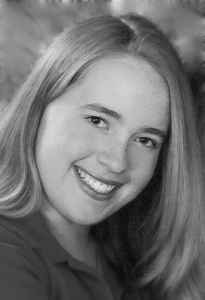

Amy L. Oblinger
When I settled down with a tub of popcorn to watch the Metropolitan Opera broadcast of Armida in high-definition at Tinseltown Cinemas, my enjoyment of the experience was as much due to the people seated behind me as the opera itself. Going into any movie or any musical performance always fascinates me, anyway: assessing the ages, styles, and group dynamics of fellow attendees. The fusion of opera and cinema, though, seemed to be a great opportunity to people-watch.
That particular evening, we'd all come to see Rossini's Armida, featuring seasoned vocalist Renée Fleming in the title (and only female) role and the younger Lawrence Brownlee opposite her. Between the synopsis perusal and the dimming of the lights, I took a moment to gauge the age distribution. My sister and I, ages 24 and 25 respectively, appeared to be a small minority. As stereotype would dictate, septuagenarians and octogenarians generally outnumbered us, with a sprinkling of the more middle-aged crowd. I was, however, particularly intrigued to see a diverse group farther towards the back: three men with sizeable gaps in their ages.
At the second-act intermission, following the ornate scene in which Armida attempts to seduce Renaldo by incorporating demons, spirits, and courtesans, I took a moment to introduce myself to that inter-generational group and find out a little more about their opera-going experience. They included Robert LaPella, perhaps best known in the Tri-Cities for co-founding the Johnson City Civic Chorale with his wife Jane. LaPella is still a respected vocal teacher in the area. Joining LaPella in the audience was Patrick Hughes, one of his vocal students, and Matt Inkster, principal trumpeter for Symphony of the Mountains.
All three of these men had attended opera broadcasts before, though not necessarily together. LaPella encourages his students to attend the opera broadcasts, and Hughes mentioned that he had seen the recent broadcast of Carmen featuring Elina Garanca in the title role. After introductions, we chatted about Armida and some of its features: Fleming's tour de force performance, the dancing demons at the opening of the second act, the abundance of male roles, and the tenor trio in Act III.
I spent some time asking this trio about their respective musical backgrounds, and I found their connection -- or perhaps "progression" -- to be an interesting dynamic of the group. When talking with Inkster about his musical endeavors outside of the Symphony, LaPella laughingly piped in, "He's a gypsy!" I asked a similar question of LaPella, who basically admitted to being a retired gypsy. Fearing I might pigeonhole Hughes as a gypsy-in-training, I avoided pushing the issue, but it may yet be a course for which he's destined.
Though appreciation for opera is what brought the retiree, professional musician, and music student to Tinseltown that evening, it was easy to recognize that the common thread of the group was a commitment to music in everyday life.
There are few special forces that can bridge the gaps between generations, and the Armida audience proves that music is one of them. Hopefully, as opera continues to come to this area (whether live on stage or via satellite into movie theatres), music will continue to be such a force.
Amy L. Oblinger, of Bristol, Va., serves as choir director and adjunct music professor at Virginia Intermont College, where she has also been involved with the theater department. In addition to volunteering with the A! Magazine Committee, she also does music directing for Theatre Bristol shows, teaches voice and piano lessons, and sings with Voices of the Mountains. A native of Bluefield, Va., Oblinger received a BA in Performing Arts from King College and her Master's in Music from the University of Edinburgh. Her academic work has included studying the music of the Iona and Taize religious communities.
READ ON: